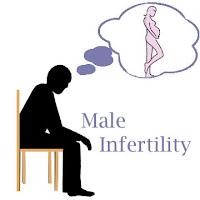Between 40% and 50% of infertility problems in the United States are totally or partially attributed to the male.
Causes
Factors that cause male infertility include:
Signs and symptoms
The obvious indication of male infertility is failure to impregnate a fertile woman.
Causes
Factors that cause male infertility include:
- varicocele, a mass of dilated and tortuous varicose veins in the spermatic cord
- semen disorders, such as volume or motility disturbances or inadequate sperm density
- proliferation of abnormal or immature sperm, with variations in the size and shape of the head
- systemic disease, such as diabetes mellitus, neoplasms, liver or kidney disease, or viral disturbances, especially mumps orchitis
- genital infection, such as gonorrhea, tuberculosis, or herpes
- disorders of the testes, such as cryptorchidism, Sertoli-cell–only syndrome, varicocele, ductal obstruction (caused by absence or ligation of the vas deferens or infection), hydrocele (collection of fluid in the testes), or infection (orchitis and epididymitis).
- genetic defects, such as Klinefelter’s syndrome (chromosomal pattern XXY, eunuchoidal habitus, gynecomastia, and small testes) or Reifenstein’s syndrome (chromosomal pattern 46XY, reduced testosterone, azoospermia, eunuchoid-ism, gynecomastia, and hypospadias)
- immune disorders, such as autoimmune infertility and allergic orchitis
- endocrine imbalance (rare) that disrupts pituitary gonadotropins, inhibiting spermatogenesis, testosterone production, or both; such imbalances occur with Kallmann’s syndrome, panhypopituitarism, hypothyroidism, and congenital adrenal hyperplasia
- chemicals and drugs that can inhibit gonadotropins or interfere with spermatogenesis, such as arsenic, methotrexate, medroxyprogesterone acetate, nitrofurantoin, monoamine oxidase inhibitors, and some antihypertensives. sexual problems, such as erectile dysfunction, ejaculatory incompetence, and low libido.
Signs and symptoms
The obvious indication of male infertility is failure to impregnate a fertile woman.
Signs and symptoms include:
Diagnosis
A detailed patient history may reveal abnormal sexual development, delayed puberty, infertility in previous relationships, and a medical history of prolonged fever, mumps, impaired nutritional status, previous surgery, or trauma to the genitalia.
After a thorough patient history and physical examination, the most conclusive test for male infertility is semen analysis. Other laboratory tests include gonadotropin assay to determine the integrity of the pituitary gonadal axis, serum testosterone levels to determine organ response to luteinizing hormone (LH), urine 17-ketosteroid levels to measure testicular function, and a testicular biopsy to help clarify unexplained oligospermia and azoospermia. Vasography and seminal vesiculography may be necessary.
Treatment
- atrophied testes
- empty scrotum
- scrotal edema
- varicocele or anteversion of the epididymis
- inflamed seminal vesicles
- beading or abnormal nodes on the spermatic cord and vas deferens
- penile nodes, warts, or plaques or hypospadias
- prostatic enlargement, nodules, swelling, or tenderness.
Diagnosis
A detailed patient history may reveal abnormal sexual development, delayed puberty, infertility in previous relationships, and a medical history of prolonged fever, mumps, impaired nutritional status, previous surgery, or trauma to the genitalia.
After a thorough patient history and physical examination, the most conclusive test for male infertility is semen analysis. Other laboratory tests include gonadotropin assay to determine the integrity of the pituitary gonadal axis, serum testosterone levels to determine organ response to luteinizing hormone (LH), urine 17-ketosteroid levels to measure testicular function, and a testicular biopsy to help clarify unexplained oligospermia and azoospermia. Vasography and seminal vesiculography may be necessary.
Treatment
- When anatomic dysfunction or infection causes infertility, treatment consists of correcting the underlying problem. A varicocele requires surgical repair or removal.
- For patients with sexual dysfunction, treatment includes education, counseling or therapy (on sexual techniques, coital frequency, and reproductive physiology), and proper nutrition with vitamin supplements.
- Decreased follicle-stimulating hormone levels may respond to vitamin B therapy; decreased LH levels may respond to chorionic gonadotropin therapy. A normal or elevated LH level requires low dosages of testosterone. Decreased testosterone levels, decreased semen motility, and volume disturbances may respond to chorionic gonadotropin.
- Patients with oligospermia who have a normal history and physical examination, normal hormonal assay results, and no signs of systemic disease require emotional support and counseling, adequate nutrition, multivitamins, and selective therapeutic agents, such as clomiphene, chorionic gonadotropin, and low dosages of testosterone. Obvious alternatives to such treatment are adoption and artificial insemination

Nice Blog…
ReplyDeleteThanks for sharing with us.
If you are seeking for the best IVF centre in Punjab for the treatment of your infertility problem then you can visit Dr Sumita Sofat Hospital in Ludhiana. Here you can get the best treatment and medication of your problem.
I started on COPD Herbal treatment from Ultimate Life Clinic, the treatment worked incredibly for my lungs condition. I used the herbal treatment for almost 4 months, it reversed my COPD. My severe shortness of breath, dry cough, chest tightness gradually disappeared. Reach Ultimate Life Clinic via their website at www.ultimatelifeclinic.com I can breath much better and It feels comfortable!
ReplyDelete